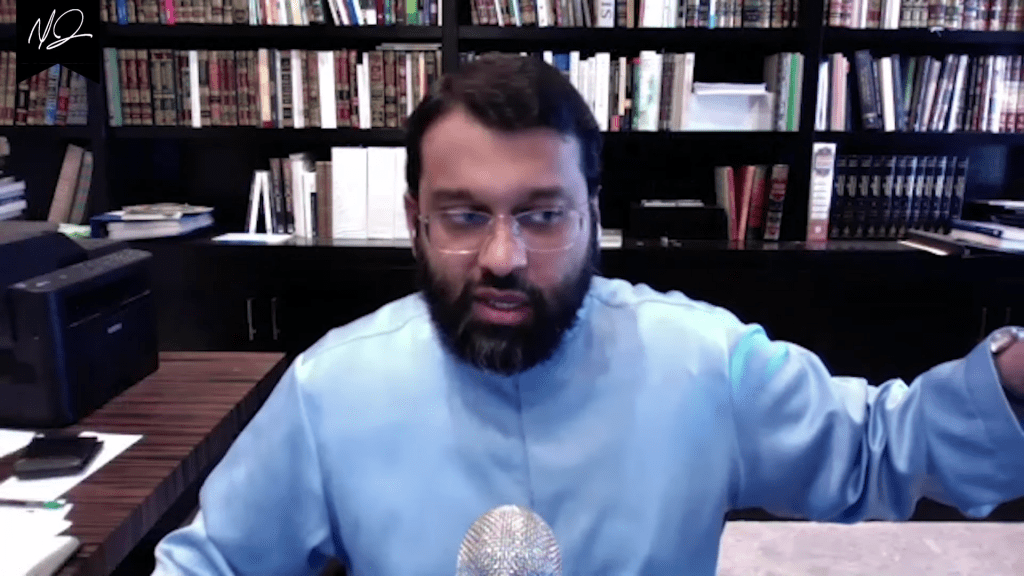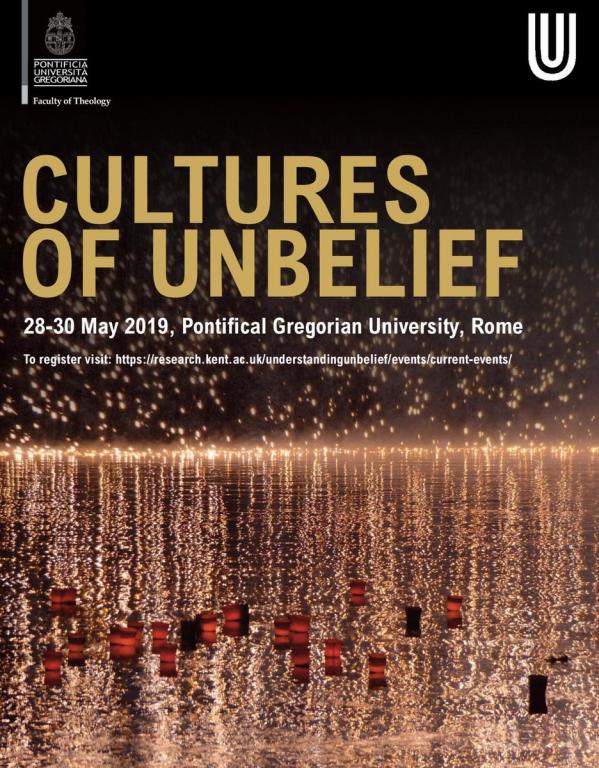In college a friend at the time once told me that she had been invited to Islam by a mutual friend of ours, a religious man who sincerely believed that Islam was the way. She expressed various reservations and declined. In response, our mutual friend told her that to the extent to which she had any objections or problems with certain Muslim practices, or even aspects of dogma, that it didn’t “really” matter, because if the central tenants of Islam resonated with her—if she was convinced that God existed, and that there was an afterlife, for example—then, you know what? What’s the big deal?
The implication was that she should just accept that there is, say, a right way to pray, even if the rules as to where to position your hands, or when and how to bow in prostration, seemed arbitrary and made-up to her. She should also just accept aspects of Islam that not only didn’t make sense to her, but were problematic to say the least. What about the punishment for “zina,” or illicit sex, which is 100 lashes according to the Qur’an? Unless, of course, you are married, in which case the punishment is death by stoning—according to Muhammad, based on not the Qur’an but sayings and accounts of the prophet and his life called the “hadith.” In other words, seemingly according to our mutual friend, the details are inconsequential.
This is an especially pernicious and dishonest “argument” that is not infrequently made by conservative and liberal Muslims alike, in response to what the popular preacher and religious leader Yasir Qadhi recently called the “minutia of [Islamic] law” in an exchange with Mustafa Akyol. That is, if you understand and accept the fundamental tenants of Islam, such as the existence of God, or the fact of the afterlife, or, if Islam in the main answers basic questions about the meaning of life and where everything came from—questions that a person who can reasonably expect to have—then you shouldn’t worry about certain rules that make no sense, or even shock the conscience. In fact, it’s the complete opposite: the latter just follow, like magic.
For example, in a recent interview, Qadhi let slip that, as a matter of fact, it is an “open secret” among academics of all stripes that historically there have been a number of different versions of the Qur’an, and that even the copy we have today admits of not insignificant differences around the world—with estimates that dozens of variations of the holy book are in circulation today. Therefore, as Qadhi himself admitted, the “standard narrative” peddled by Muslims and taught to young children that the book has been preserved with nary a change for over 1400 years “has holes in it.” This, of course, goes against the article of faith that the Qur’an is the direct word of God and what we have today is what was revealed verbatim to Muhammad centuries ago. However, when pressed by the host, Mohammed Hijab, Qadhi declined to elaborate and told him that he’d rather not discuss the topic “in public”—lest viewers be confused and alarmed. Better that Hijab ask any questions he had off camera.
And for Muslims who were watching—many of whom are young and follow Qadhi with zeal, and who have been led to believe that the current version of the Qur’an is identical to the copy God has in heaven? According to Qadhi, they needn’t worry their pretty little heads. In fact, it’s only religious scholars—you know, people who know what they’re talking about and aren’t biased at all—who can be trusted with such explosive information, not us, the intellectual rabble in comparison, who would, it seems in Qadhi’s view, leave Islam en masse.
It boggles the mind how people as esteemed—and, educated or learned as Qadhi—can in good conscience tell people to dismiss objections they have to aspects of Islam they perceive to be arbitrary or offensive, just because he says so. In fact, during the interview itself Qadhi lamented the fact that in academic circles, there is a spirit of doubt in the first place. According to him, it is preferable that Muslims “respect” doctrine and not probe it too much, lest they uncover something that might undermine their belief.
Dude has a PhD in Islamic studies from Yale, for God’s sake. In fact, it’s precisely during his training that he came to learn that the Qur’an had not been perfectly preserved after all, resulting in what appears to be a crisis of faith (or “knowledge,” as he prefers to call it) for the young Qadhi, a not implausible episode in his life that he also shares during the interview. And yet here he is, counseling everyone else to not do what he did—which was, presumably, to probe the evidence and trust his own judgment. In fact, so incensed the learned scholar was at the fact that he had been forced to expound on the apparent multiplicity of the Qur’an in the first place that he rails against his own students—young Muslims who had outed his doubts in a series of leaked emails. “Idiots,” he calls them in the interview, “utter idiots” for having exposed the dark subject to (what he contemptuously refers to as) “the masses.”
Of course, it can be queried how anyone, and not just a scholar, can advise believers and nonbelievers, many of whom have honest objections to traditional Muslim views about, say, pork, or slavery, to shut up and just forget about it. But the fact of the matter is such people exist. Again, there are people in my own experience who have advised me or people I know, whether they are already Muslim or are considering Islam—or, alternatively, have merely been invited to it—to simply suppress their conscience and turn off their minds like idiots or robots and do as they’re told.
Not only is it farcical on its face, but the thesis that the details don’t matter or are largely inconsequential would be rejected out of hand in any other context. Imagine if someone—a friend, say—recommended a book to you. You are told the book is an academic work, and everything in it is true, or must be, because the author is a renowned scholar and knows what they’re talking about (allegedly). But say you read the book and despite agreeing with some passages, you find other passages unintelligible or under-motivated, and some outright wrong. You concede that the portions that resonate with you are true, but the rest is a confused morass that makes no sense, at best, and is offensive, at worst. Imagine if your friend then said, well, to the extent to which you agree with some of it, you not only should accept the rest wholesale, but, as a matter of fact, you do accept it—already. You’d throw the book right back in their face, I reckon—or, at least, I would, and for more reasons than one.
For one, it’s perfectly tenable to accept some claims but reject others—whether they’re made as part of an academic work, government policy, or religious worldview. Obviously, a person can accept that God exists—or even that there is an afterlife, and that the Qur’an is God’s last testament to humanity—but at the same time reject the punishment for fornication and adultery as interred in the Qur’an and the hadith as arbitrary and barbaric, to give just one example. Likewise, a person can maintain any number of beliefs about Islam, but deny that the Qur’an is inerrant, or has been preserved in the same form for hundreds of years, based on credible evidence that it’s been altered or that different versions exist.
It is easy to see how silly and obscure the argument really is in the context of a nonbeliever being invited to Islam, compared to a Muslim who already believes. The nonbeliever is being sold a new faith, and can decline at any time for any reason, because they already have a perfectly legitimate alternative: continuing to believe whatever it is they already believe. In contrast, the believer cannot reject any aspect of Islam on pain of inconsistency—which brings me to my next point: to the extent to which it is said that it is inconsistent to accept some aspects of Islam but reject others (referred to pejoratively as the “shopping cart” model of religion), there is no obligation to accept any of it anyway. It’s not as if there are no other options. The obvious one is just to reject Islam overall—even if it is the case that some if not many aspects are arguably good or true. So the argument that the nonbeliever especially should just accept aspects of Islam they have reason to reject and stop asking questions “just because” is a nonstarter.
However, in the the context of a Muslim who already believes, but has come across aspects of Islam that do not resonate with them or they disagree with, the “argument” is shown in its true light as the ruse it really is: a means to suppress dissent and shut down critical thinking. After all, if the believer is told to forget about any inconstancies, or put aside any grievances they have with elements of doctrine or certain rules, then there can be no independent thought: just an exercise in willful blindness.
But not only is it preposterous to suggest that people should just accept Islam as is like so many sheep, but it’s offensive. You’re basically saying the typical believer (or nonbeliever, for that matter) is stupid, and doesn’t know any better, so they might as well shut up and just submit to Islam as it has been given to them, despite any good faith reservations or concerns they might have. Again, the implication is that scholars know best, even though, as Qadhi himself professes during the interview, Muslim thinkers themselves hotly contest the nature of variations of the Qur’an—what he refers to variously as the “ahruf” and “qira’at,” the former being different modes or versions, and the latter, different ways or styles of pronunciation. In fact, Qadhi bemoans that the problem of the ahruf or the qira’at has confounded religious scholars for centuries, and not one of them has produced a satisfactory answer.
How condescending can you get? Not only is dismissing good-faith concerns on the part of any number of lay Muslims (many of whom figure among his own followers), or advising them to not think about “it” too hard or inquire into it very much, arrogant in the extreme, but it doesn’t even make any sense. Why is the issue as to the nature—indeed, the very origins—of the Qur’an the sole province of an elite cadre of religious scholars like Qadhi, if he concedes that even among Muslim thinkers, scant progress has been made as to a potential “answer” in over a 1000 years? In contrast, secular scholars and academics have largely embraced the fact that the Qur’an has exhibited changes over time, however slight or inconsequential according to believers—or, at the very least, that the origins of the holy book are obscure.
For example, again, there are currently dozens of albeit slightly different versions of the Qur’an in circulation around the world—few of which the contemporary believer has likely encountered (unknowingly) for regional reasons. A number of ancient manuscripts of the Qur’an have also been discovered, some of which differ from the book we have today, including the Sana’a manuscript, (a palimpsest the lower layer of which contains words and phrases not included in the standard version), as well as the Samarkand manuscript, which also appears to exhibit slight differences. Religious scholars themselves have historically recognized alternate readings of the Qur’an in the form of the ahruf or qira’at for centuries as well. According to one academic, Shady Nasser, variant readings existed from the outset, with whole treatises on the subject arising in the Muslim world as soon as the 8th century CE. Traditional sources also hold that upwards of seven ahruf and 14 qira’at existed in the early days of Islam. Muhammad himself revealed that the Qur’an was sent down in seven modes and periodically authorized different readings on an ad hoc basis. What’s more, there is the fact that the Qur’an had to be standardized in the first place, by no less than the third khalifa, or caliph, of Islam, Uthman ibn Affan. According to believers, the close friend and follower of Muhammad finalized what would come to be known as the modern or “Uthmanic” copy of the Qur’an we have today, ostensibly in an attempt to reduce the number of ahruf to one some 20 years after the prophet’s death—not just because deviant readings had begun to emerge, but because numerous companions of Muhammad who had memorized the Qur’an had fallen in battle—and ordered that alternate versions be burned. None of the myriad other copies at the time referenced in the literature appear to have survived. But there is evidence that differences existed. There are even reports that the process of recension was itself controversial, and that many of the prophet’s followers did not cooperate with Uthman. For example, one of Muhammad’s own wives, Hafsa, who had previously been entrusted with the most authoritative copy of the Qur’an at the time, initially refused to forfeit it to Uthman.
Finally, and most disturbingly, in my view, for the believer, is the confusing morass of accounts Qadhi himself alludes to that go back to the early days of Islam—in which the Qur’an appears to have undergone a series of sometimes radical changes, before Uthman standardized what is believed, again, to be the prevailing version today. A number of verses and passages are said to be missing, according to the prophet’s own followers at the time—everything from the infamous “Satanic Verses” (an incident the Qur’an appears to reference to this day) to the “rajm,” or “stoning,” verse, reported most prominently by Umar ibn al-Khattab, the second khalifa and an ardent follower of Muhammad as well. Umar complained that later generations of Muslims would come to neglect an apparent verse in the Qur’an that required that adulterers be executed via stoning, but that had been lost to time—a punishment that, like I said, has been preserved in the hadith. There is even evidence that an astonishing 200 verses are missing from Surah Azhab, the 33rd chapter of the Qur’an, which would have made it the longest in the holy book. Aisha, another wife of the prophet, also attested that the verses existed prior to Uthman’s recension of the Qur’an, but appear to have been lost—an account that has been known to Muslims for generations. In fact, she reports that the rajm or stoning verse was part of the portion of Surah Azhab lost, but that it had previously been written down, only to be consumed in the aftermath of Muhammad’s death—by an errant sheep. The same account details that another verse—this time about breastfeeding (apparently, and bizarrely, of adults)—was also omitted in the final product, again, according to the “mother of believers.” Muslim scholars even dispute whether whole surahs or chapters are missing from the Qur’an. For example, there is evidence that Ubay ibn Ka’b, one of Muhammad’s personal scribes, had a copy that included two additional surahs subsequently omitted from the Uthmanic version. Another surah appears to have been forgotten entirely, save for a verse about “the son of Adam” that is wholly missing from the Qur’an today (it seems Muhammad’s followers also disputed whether the admonition against greed was best understood as a passage in the Qur’an or the hadith). The fact that so many verses and passages, if not whole chapters, appear to be missing from the Qur’an even led some early Muslims to concede that much of it had been lost, and that complete knowledge of the holy book would forever elude believers.
Of course, it may very well be the case that for the most part, the Uthmanic version has remained stable for the better part of 1400 years, and that copies of the Qur’an that have been discovered which exhibit variations do not represent different versions of the Qur’an in circulation at the time. (For example, Asma Hilali regards the Sana’a manuscript as a workbook used in an educational setting for future scribes, not intended to be shared in public—hence the numerous “errors” in the lower text. However, this is disputed. According to another academic, Mohsen Goudarzi, variations in the lower text can be traced to independent sources in the literature. This suggests that the lower text corresponds to a distinct version of the Qur’an.) And perhaps early Muslims had a good reason to standardize the Qur’an, if only to avoid the fate attributed to the Torah and Bible. I also do not endorse a revisionist history of the Qur’an according to which it has been radically altered or expounded over the course of centuries, rather than roughly over the course of Muhammad’s 23 year ministry—because I don’t know. I’m not a historian, and we’ll likely never know the true origins of the Qur’an. In fact, my understanding is that, for the most part, secular academics agree that revisionist histories of the Qur’an are not supported by the evidence. At the same time, it’s understood that changes have occurred and that the book has developed and matured over time in subtle and minute ways. In fact, there’s even evidence to suggest that early Muslims embraced the idea of a fluid or multifarious Qur’an, and that the idea that it has been perfectly preserved in its original form was a modern innovation that arose in later centuries. It’s not as if the doctrine can be clearly traced to the Qur’an. For such an integral belief, the holy book seems to give it short shrift.
The point is, even if there is a single, unitary text that has been preserved, according to contemporary Muslim belief, the historical record is anything but clear. But rather than encourage believers to take a look for themselves, conduct their own research and rely on their own judgement, Qadhi would rather that we not ask questions in the first place—either because he doesn’t know the answer, or believes we’re too stupid to understand. No wonder Qadhi’s own followers have erupted on social media around the world, with video of the interview embarrassingly truncated and the ending cut by the host himself, lest its salacious content contaminate the impressionable minds of lay believers everywhere. It’s even been suggested that Qadhi is ex-Muslim atheist in disguise, so terrible a Pandora’s box he opened—despite the fact that, as he admits, variations of the Qur’an are known to exist among secular academics and graduate students of Islam today (which, as an aside, is preposterous—Qadhi is clearly a firm believer).
The argument that details don’t matter is untenable for another reason: if the person is wrong, and the relevant aspects of Islam that appear to make no sense do, in fact, make sense, or if they appear to be offensive but actually aren’t, then why isn’t it apparent? If it is so clear that Islam is the “true” religion, then why isn’t it obvious what the purported wisdom of this or that aspect of Islam is? If it is truly wrong to eat pork, for example, then why hasn’t a single Muslim since Muhammad’s death in 632 CE furnished one good reason? And why do people care how old Aisha was when she married Muhammad, a topic that is fiercely debated by religious scholars and lay Muslims alike, or the fact that the prophet not only allowed his adherents to own slaves, but owned slaves himself—an institution that is arguably one of the most diabolical and hideous ever devised in human existence—if what the prophet did was truly justified?
Put in yet another way, why is there a need to conceal aspects of Islam that are perceived to be problematic or inconsistent in the first place? If it really is the case that the Qur’an, unlike, say, the Torah or Bible, has indeed been preserved for all time, as purported by the Qur’an itself and generations of Muslims since, then why is history littered with different readings of the Qur’an? Likewise, why did Muhammad’s own followers shortly after his death argue so vehemently over which versions of the Qur’an were authoritative, or which passages should be included? According to Qadhi, the “sahaba” or “companions” of the prophet, people who accepted Islam during his lifetime, were themselves confounded by the very idea of the ahruf and qira’at. As Qadhi confirms in hushed tones, “this is not a joke, brothers and sisters.”
It’s one thing for God to be “al hakeem,” or “the most wise,” but another thing entirely for there to be no evidence of his wisdom. Either there should be nothing to complain about in the first place, or it should be obvious what the answer is. The fact that the answer—to the problem of different versions of the Qur’an, or any number of other, urgent questions believers and nonbelievers both have about controversial aspects of Islam—is not forthcoming shows that, in all likelihood, it doesn’t exist, and that the only way to “accept” the religion on the whole is to stop asking questions.
Which brings me to my next complaint: the argument is a ruse precisely because it is a lie. Not only are the typical purveyors—conservative Muslims and so-called scholars like Qadhi who have traditional views about Islam—lying to their adherents and potential converts to Islam, but people who endorse the idea that they should just forget about any grievances or objections they have and do as they’re told, either because it’s not their business or not a big deal, are lying to themselves. It renders all of Islam a fraud perpetrated by believers and religious leaders alike if no one can ask questions or if questions are stigmatized, to be relegated to the shadows or secular academia. Otherwise, the very same Muslims would surely come to reject Islam, or, at the very least, aspects of the religion they perceive to be irrational or offensive—not feel compelled to swallow them begrudgingly like some vile potion, as suggested by Qadhi.
Either way, Muslims who argue that we should accept even aspects of Islam that are mysterious or nonsensical, at best, or offensive and heinous, at worst, are committed to the view that a complete understanding of Islam on the part of the lay believer is impossible. Certain aspects elude even trained (albeit religious) scholars so there’s no use trying. Our job is to be mindless drones and just do as we’re told. After all, the very meaning of “Islam” is “submission” (not “peace” as is often said). But if there are indeed aspects of Islam that are beyond our grasp, then we have no reason to accept them—or Islam writ large, to the extent to which it is (as many if not most Muslims say) an all-or-nothing deal. No cherry-picking allowed.
But more importantly, there is no value to religious belief then, if it is just one big lie designed to suppress dissent or critical thinking, on one hand, or dismiss genuine anxiety that any rational and humane adult would have at certain ostensibly problematic aspects of the faith, on the other. But if it’s largely inconsequential what the fact of matter is, why does he care so much what any one Muslim believes? Otherwise, Qadhi’s advice that we should effectively deceive ourselves as a collective in order to conceal the Qur’an’s obscure origins makes no sense—hence, his own concession in the interview that in academic circles, such a limit on freethinking is an anathema and unthinkable.
This is why it is not inaccurate to say that in circles frequented by Yasir Qadhi and his ilk, the truth has no value—only belief.

















